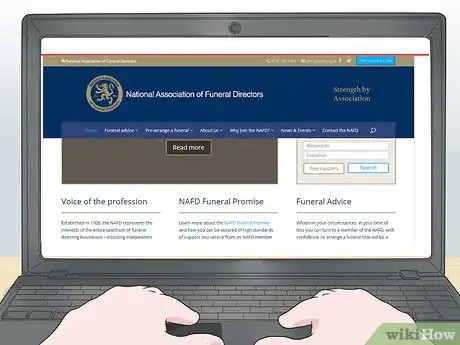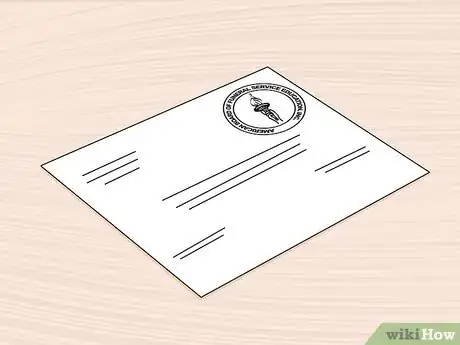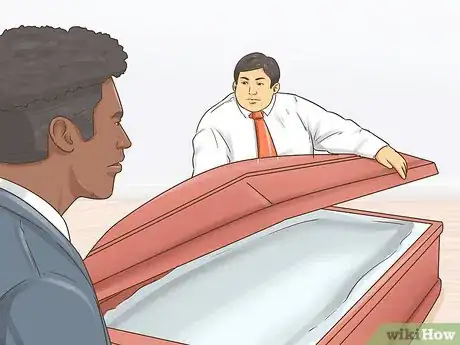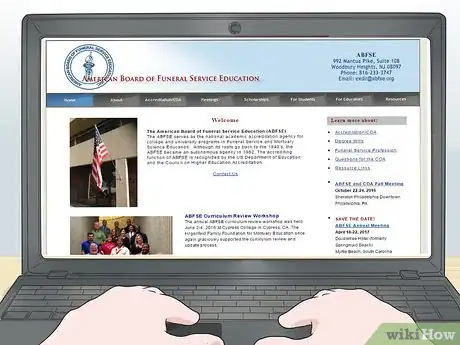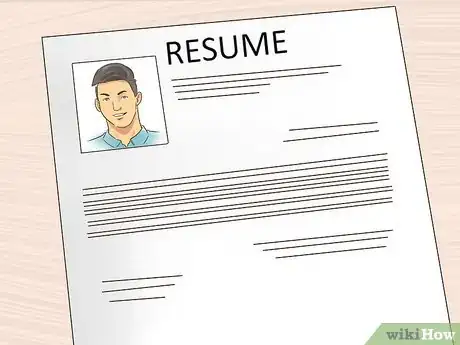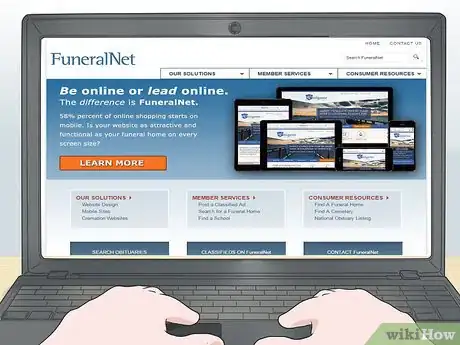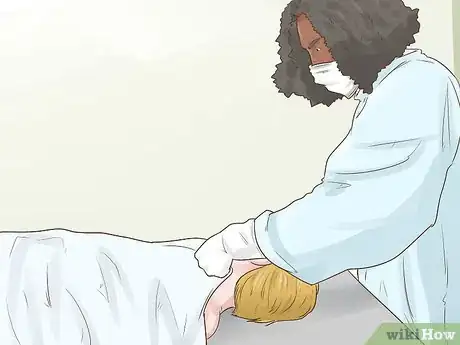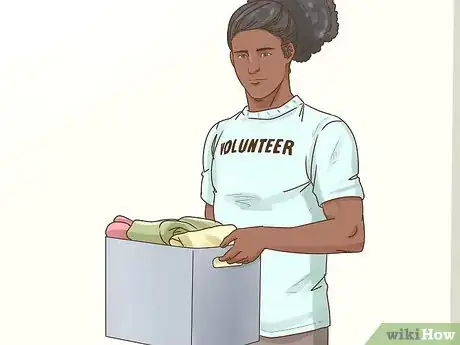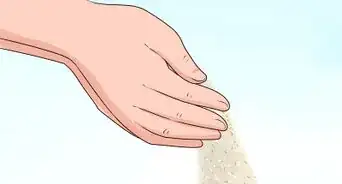This article was co-authored by David I. Jacobson. David I. Jacobson is the founder of Chicago Jewish Funerals, an independent Jewish owned funeral provider that evolved into two funeral homes in the Chicagoland area. With over 30 years of experience serving families, David is a leading expert on Kavod Hamet, the Jewish traditions of honoring and respecting the dead. David is an active funeral director that serves people planning and in need of funerals, lecturing to congregations, community groups, and schools extensively about the values of the Jewish funeral as well as the dying process and the value of one’s legacy.
wikiHow marks an article as reader-approved once it receives enough positive feedback. In this case, 92% of readers who voted found the article helpful, earning it our reader-approved status.
This article has been viewed 132,890 times.
A funeral director oversees the details regarding the memorial services of the deceased. Working closely with the family and friends of the departed individual, the funeral director guarantees that a memorial service meets the needs and wishes of the deceased and his or her loved ones. In learning how to become a funeral director, you should first and foremost possess a natural empathy for those who are grieving and a desire to help them through this difficult and painful process. In the US and elsewhere, you will also need specific training and certification. Becoming a funeral director is a long path but, if you are dedicated, it can be very worthwhile.
Steps
Getting Your Education and Certification
-
1Look into informal training. Depending on your state's requirements, a formal education may not be necessary. Many funeral directors in the United States were born into the trade, or gained entry via a local business early on. If a local funeral home is willing to provide you training, informal training may be enough to eventually obtain an apprenticeship and a license.[1]
- Keep in mind, most funeral homes will only provide training to those with formal education. However, if time and money are an issue, check with local funeral homes.
- Arrange a meeting in which you discuss your interests in becoming a funeral director. Convey your willingness and excitement to learn. If you seem dedicated, a local funeral home may provide you with training.
- Look for entry-level jobs working at a funeral home. In addition to helping you get informal training, it's a great way to try out the profession before you commit to going to school for it.[2]
- In the UK, an online course is required before hand, which you can take through the National Association of Funeral Directors. Only after taking this course can you receive on-the-job training.[3]
- Even with informal training, you do need at least a high school diploma or GED.
-
2Pursue an associate's or bachelor's degree. In most cases, formal education is required. A bachelor's or associate's degree in a field like mortuary sciences is usually necessary to becoming a funeral director. Programs range from two to four years.[4] If you're working in the UK, however, a degree is not as necessary as there are specific training classes provided through the National Association of Funeral Directors.[5]
- Most schools accredited with the American Board of Funeral Service Education (ABFSE) offer associates programs, frequently through community colleges. A few schools do offer four year tracks. Check your state's requirements to see if an associate's or bachelor's is needed in your state to receive your license.
- During your time in school, you will study things like ethics, grieving, and business law. You will also learn the basics of embalming a body and otherwise preparing it for burial.[6]
Advertisement -
3Gain relevant work experience. While you're pursuing your education and training, work on your resume. The kind of training you make for yourself matters. Take on part time jobs that will help diversify your resume and increase your chance of employment.[7]
- In many funeral homes, a small amount of office management experience is needed. Look for administrative work. You can, for example, work as a secretary or assistant part time as you complete an apprenticeship or associate's degree.
- You should also look into jobs where you work with others. Interpersonal communication skills are vital to becoming a funeral director. Try to work in an environment where you may deal with death or grieving. For example, you could work in an emergency room.
-
4Complete an apprenticeship. Most states require you complete an apprenticeship with a local funeral home to become a licensed funeral director. You will need to find a licensed funeral director willing to sponsor you. Your college or training program may provide you with a sponsor. You may also have to ask around at local funeral homes.[8]
- During your apprenticeship, you will work under the supervision of a licensed funeral director. You will shadow the funeral director and participate in work in a real funeral home. Lengths vary between one and three years.
- Pay close attention to your mentor during your apprenticeship. Work hard and be a good student so you can soak up as much information as possible.[9]
-
5Check licensing requirements in your state. Every state's licensing requirements are different. Make sure you contact ABFSE to check requirements in your state. You will need to work as an apprentice for a number of years. Each state has a specific exam you must pass to become a funeral director.[10]
- Some states more education than others, and fees vary. In California, for example, you need an associate's degree in arts and sciences. You cannot be educated formally. The application also comes with a $100 filing fee.[11]
- How you sign up for the licensing exam varies by state. There may be some fees required to take the exam.
-
6Study for the licensing exam. The funeral director licensing exam is not easy, so study hard. You should be able to find study materials and guides online, as well as practice tests. Make time each day to study the material to ensure you get a passing grade.[12]
- Find a good place to study. You should find an area free of outside distractions with good lighting and plenty of room. You should not bring any distracting materials, like a cell phone, to your study space.
- Make sure to stick to a study schedule. Find a time each day when you can reasonably study. Sit down at that time every day for a study session.
- Take breaks. You cannot study for hours on end without burning out. Make sure to give yourself 5 minutes every hour or so to unwind.
-
7Complete the licensing exam. The licensing exam is usually multiple choice, and you must take it at a testing center near you. You usually take your exam electronically. There will be a brief tutorial prior to the exam instructing you on how to use the computer.
- There will be a fee to register and take the exam. Fees very by state.
- You usually have to leave personal items, like electronics and drinks, outside the testing area.
- You will receive your score as soon as you complete the exam. In the event you don't pass, you will have to take the exam again and pay any fees.
Beginning Your Career
-
1Write a solid resume. A resume is an important tool on your job hunt. Once you've passed your exam, write a resume to send it out to potential employers.[13]
- List any relevant experience you have. In addition to things like your apprenticeship, including any part time jobs or volunteer work that would help with a career as a funeral director.
- Make sure to use language involved in the funeral service industry. For example, if you worked in an emergency room, talk about helping bereaved families during times of stress. Make sure to keep your entries concise.
- Keep the formatting of your resume consistent throughout. Things like your choices in fonts, bullet points, and so on should have a pattern.
-
2Search for a job. There will be a lot of competition for open positions, so be patient. You will likely have to send your resume out to many places before you hear back. You may have to move to find a job, so do not hesitate to apply to places outside your area.[14]
- If you're still in school, look into job placement services there.
- You can search job boards, like Monster, Indeed, and FuneralNet.
-
3Practice good interview skills. Once you land an interview, go in prepared. A solid interview can help get you your first job in the industry. Research the funeral home ahead of time so you have a sense of its ethics and mission. Show up dressed professionally and give a polished, professional interview.[15]
- Practice answering common questions, such as "What problems have you faced throughout your professional career?" and "Why would you be a good asset to our funeral home?" Make sure to prepare answers that showcase your best qualities.
- Ask questions at the end of the interview, like, "What's the company culture like here?" You want to show you're genuinely interested in the job.
- Be polite at the conclusion of the interview. Shake the interviewer's hand and thank him or her for taking the time to see you.
Assessing Your Suitability
-
1Learn about the career path. As with any career, you want to make sure becoming a funeral director is right for you. Working with the deceased and grieving families can be rewarding as you'll be helping others through difficult times. However, the job can be very demanding at, at times, stressful.
- Working in a funeral home for at least 6 months will help you determine whether it's a good career path for you.[16]
- You will coordinate funerals as a funeral director. You will work with families to settle on funeral arraignments. You will take care of logistical concerns, like transporting bodies and preparing obituary notices.
- You will also prepare bodies for burial. You will clean and embalm bodies. If the funeral is open casket, you will prepare the bodies for viewing.
- A good deal of emotional and physical energy is required in becoming a funeral director. A lot of work goes into preparing a funeral, so your hours will be long. You also have to work on comforting grieving families, which can take an emotional toll with time. Many people find the work rewarding, however, as you're able to help people gain closure after a loved one passes.
-
2Work on cultivating the right qualities. Certain skills are necessary to become a funeral director. Before you even begin formal training, there are certain life skills you need to become a funeral director.[17]
- Interpersonal skills are a must for a funeral director. Try to take psychology courses in high school, and look for opportunities to work with people. Volunteer work, in which you work directly with others, can help hone interpersonal skills.
-
3Think about whether you can handle the emotional toll. Being a funeral director can be hard. You will have to deal with emotional people day in and day out. Dealing with death on a daily basis can also feel depressing. If you feel burnt out, make sure to turn to family and friends for emotional support.
- Have a strong support group. Make sure you always have other people around to talk to.
- If necessary, you may have to seek out a therapist at some point to manage the stress of this demanding career.
- If you're high stress by nature, or feel uncomfortable dealing with death and dying, this may not be a good career path for you.
Expert Q&A
-
QuestionWhat qualifications do you need for a funeral director?
 David I. JacobsonDavid I. Jacobson is the founder of Chicago Jewish Funerals, an independent Jewish owned funeral provider that evolved into two funeral homes in the Chicagoland area. With over 30 years of experience serving families, David is a leading expert on Kavod Hamet, the Jewish traditions of honoring and respecting the dead. David is an active funeral director that serves people planning and in need of funerals, lecturing to congregations, community groups, and schools extensively about the values of the Jewish funeral as well as the dying process and the value of one’s legacy.
David I. JacobsonDavid I. Jacobson is the founder of Chicago Jewish Funerals, an independent Jewish owned funeral provider that evolved into two funeral homes in the Chicagoland area. With over 30 years of experience serving families, David is a leading expert on Kavod Hamet, the Jewish traditions of honoring and respecting the dead. David is an active funeral director that serves people planning and in need of funerals, lecturing to congregations, community groups, and schools extensively about the values of the Jewish funeral as well as the dying process and the value of one’s legacy.
Funeral Home Director Being compassionate is key. As a funeral director, you'll need to connect with your clients during a difficult time in their life in order to build relationships and be successful. A good rule of thumb is to treat every funeral as though it were for someone in your own family.
Being compassionate is key. As a funeral director, you'll need to connect with your clients during a difficult time in their life in order to build relationships and be successful. A good rule of thumb is to treat every funeral as though it were for someone in your own family. -
QuestionHow do I know if I should become a funeral director?
 David I. JacobsonDavid I. Jacobson is the founder of Chicago Jewish Funerals, an independent Jewish owned funeral provider that evolved into two funeral homes in the Chicagoland area. With over 30 years of experience serving families, David is a leading expert on Kavod Hamet, the Jewish traditions of honoring and respecting the dead. David is an active funeral director that serves people planning and in need of funerals, lecturing to congregations, community groups, and schools extensively about the values of the Jewish funeral as well as the dying process and the value of one’s legacy.
David I. JacobsonDavid I. Jacobson is the founder of Chicago Jewish Funerals, an independent Jewish owned funeral provider that evolved into two funeral homes in the Chicagoland area. With over 30 years of experience serving families, David is a leading expert on Kavod Hamet, the Jewish traditions of honoring and respecting the dead. David is an active funeral director that serves people planning and in need of funerals, lecturing to congregations, community groups, and schools extensively about the values of the Jewish funeral as well as the dying process and the value of one’s legacy.
Funeral Home Director Work at a funeral home for at least 6 months. That will help you decide whether the industry is right for you.
Work at a funeral home for at least 6 months. That will help you decide whether the industry is right for you. -
QuestionCan I take the funeral home course at home?
 Community AnswerThere are online programs you can enroll in that will give you a bachelor's or associate's degree. However, you will still need to complete an apprenticeship in an actual funeral home.
Community AnswerThere are online programs you can enroll in that will give you a bachelor's or associate's degree. However, you will still need to complete an apprenticeship in an actual funeral home.
Warnings
- Since a funeral director works within many different areas of the company, he/she may have to help prepare the body for presentation. Funeral directors go to significant lengths to protect themselves from any diseases or illnesses that contact with the dead could cause.⧼thumbs_response⧽
References
- ↑ http://www.morticianschool.net/become/
- ↑ David I. Jacobson. Funeral Home Director. Expert Interview. 14 July 2020.
- ↑ https://nationalcareersservice.direct.gov.uk/advice/planning/jobprofiles/Pages/funeraldirector.aspx
- ↑ http://www.morticianschool.net/become/
- ↑ https://nationalcareersservice.direct.gov.uk/advice/planning/jobprofiles/Pages/funeraldirector.aspx
- ↑ http://www.bls.gov/ooh/personal-care-and-service/funeral-service-occupations.htm#tab-4
- ↑ http://www.bls.gov/ooh/personal-care-and-service/funeral-service-occupations.htm#tab-4
- ↑ http://www.morticianschool.net/become/
- ↑ David I. Jacobson. Funeral Home Director. Expert Interview. 14 July 2020.
- ↑ http://www.morticianschool.net/become/
- ↑ http://www.cfb.ca.gov/licensee/fundir.shtml
- ↑ https://psychcentral.com/health/highly-effective-study-habits
- ↑ http://www.morticianschool.net/become/
- ↑ http://www.morticianschool.net/become/
- ↑ http://www.morticianschool.net/become/
- ↑ David I. Jacobson. Funeral Home Director. Expert Interview. 14 July 2020.
- ↑ http://www.bls.gov/ooh/personal-care-and-service/funeral-service-occupations.htm#tab-4
About This Article
If you're thinking about becoming a funeral director, start by assessing whether you can handle the physical and emotional stress of coordinating funerals and comforting grieving families. If you think this job is right for you, look for volunteer opportunities so you can develop interpersonal skills like empathy and compassion. Additionally, contact local funeral homes to see if they are willing to provide informal training. You may also be required to take a licensing exam before you can start working as a funeral director. For more tips, like how to study for the licensing exam, read on!
